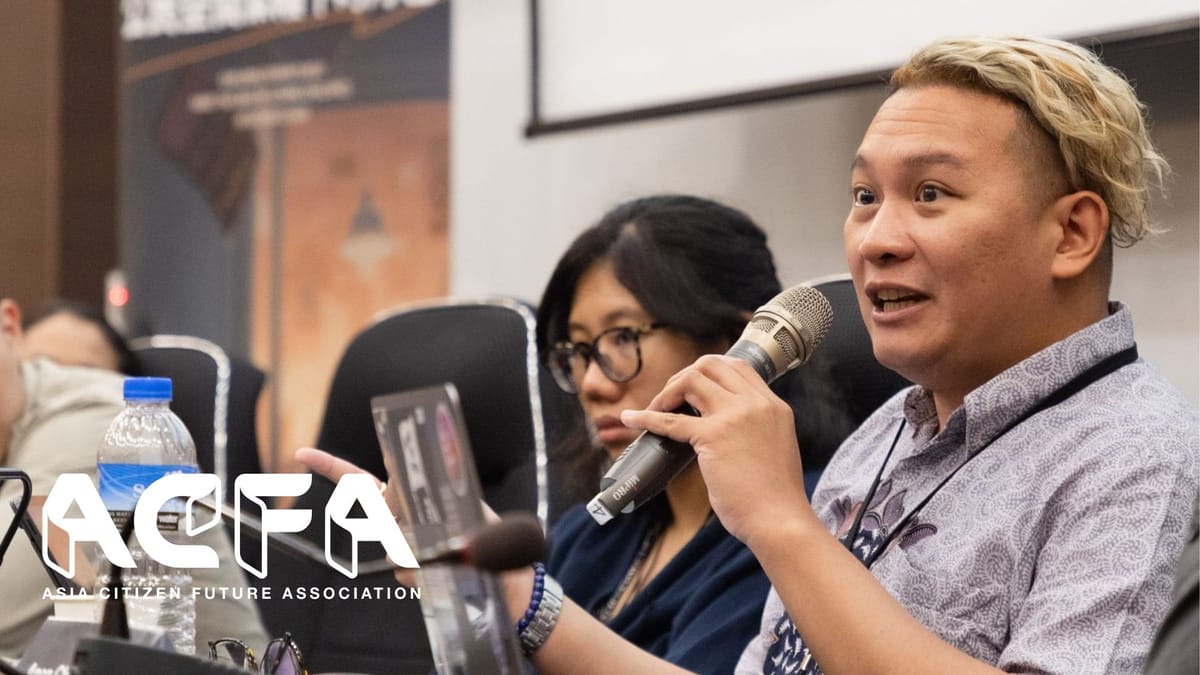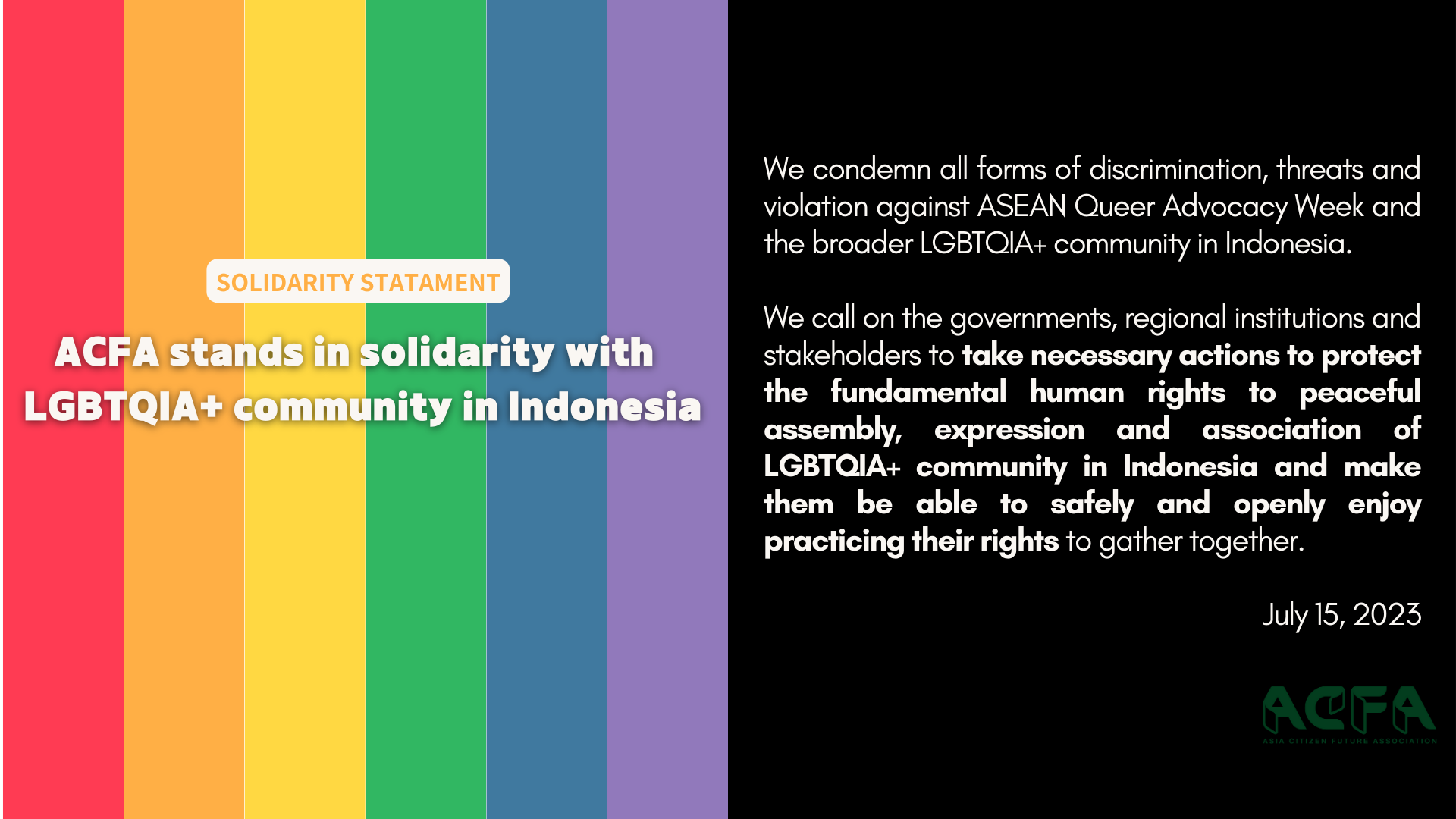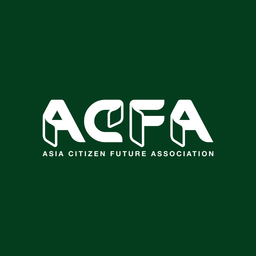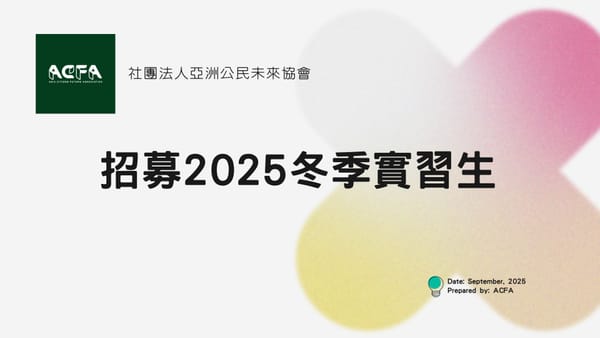LGBT+ rights to association in Southeast Asia by Ryan

Note taking: Doris Yang / Editing: Leah Lin
ACFA (Asia Citizen Future Association) is honor to invite Ryan Silverio from ASEAN SOGIE Caucus to talk about LGBT+ rights in Southeast Asia having a focus on the rights to association in the Philippines. This is the record of the sharing of Ryan Silverio on ACFA's report launch forum on 22 August,"Exploring Taiwan's Roles Amid The Crisis of Closing Civic Space in the Southeast Asia" during the ACFA 2023 Taiwan and Southeast Asia Civil Society Week.
Speaker
Ryan Silverio (they/them) is a gender queer human rights defender with more than 20 years experience in the non-profit sector. They worked in the intersections of human rights, child rights, and LGBTQIA+ rights in various capacities. Since 2014, Ryan has served as the Executive Director of ASEAN SOGIE Caucus (ASC), a regional human rights organization.
Under Ryan's leadership, ASC achieved key milestones, including transformation from a loose network into a registered non-government organization whose mission is to expand spaces for leadership and advocacy among LGBTQIA+ activists in Southeast Asia; sustained funding for a period of 9 years; and being granted with special consultative status by the UN ECOSOC.
ASEAN SOGIE Caucus (ASC)
ASEAN SOGIE Caucus (ASC) is a regional human rights organization and a networl focusing on LGBT+ issues. Its work covers 11 countries in Southeast Asia region.
When the ASC was trying to register in the Philippines, they ran into some challenges. The name, 'ASEAN SOGIE Caucus', was refused because 'ASEAN' was trademarked and 'SOGIE' is an acronym for 'sexual orientation, gender identity, gender expression'.
The process of ASC's registration thus entailed a huge number of discussion by members from countries in ASEAN to come up with a name. Finally, the ASC decided to register as 'Southeast Asia Sexual Orientation, Gender Identity and Expression Caucus (ASC), Inc'.
Besides challenges during the registration process, the ASC also had to ensure that over half of the board members are Filipinos, which is in avoidance of being accused with the 'Anti-Dummy Law'. Anti-Dummy Law has been used to attack other civil society organizations in the Philippines.
ASC focuses on supporting LGBT+ groups to have access to the regional and international human rights mechanism, including the UPR processes and special procedures. It has supported more than 80 local initiatives of local organizations.
Encountering the trend of shrinking civic space in recent years, the ASC has to give priority to supporting emergency situation of activists as LGBT+ community have been targeted by many repressive governments among the region.
As a regional human rights organization, the ASC tried to get CSO accreditation from the ASEAN Intergovernmental Commission on Human Rights (AICHR), but it failed because Brunei vetoed ASC's application. Such rejection can be seen as an indication of the difficulties LGBT+ rights organizations face among Southeast Asia.
SOGIESC in Southeast Asia
The recognition of SOGIESC (sexual orientation, gender identity, gender expression and sex characteristics) as an inherent element of human rights obligation within ASEAN is very low.
Indonesia and Malaysia are two of the countries that have objected various Human Rights Council resolutions related to LGBT+ rights. Furthermore, state and non-state actors usually justify their harassment against LGBT+ rights as defending national security or protecting public morals.
Many Southeast Asian countries consider LGBT+ rights as Western agenda. In recent years, atacks against LGBT+ rights have been fueled by right-wing and conservative religious groups using rights-based principles. For example, freedom of religion, narrow interpretation of democracy, and the majority-minority dynamics have been used by such groups to claim that LGBT+ groups are minority, therefore they should not be recognized.
At the same time, criminalization of LGBT+ persons remain in Southeast Asia. Brunei, Myanmar, and Malaysia still enforce the British colonial position of the anti-sodomy law with the Section 377A of the Penal Code. Besides, there is a lack of legislation to protect LGBT+ persons from discrimination.
In the Philippines, for example, people have been advocating for an anti-discrimination bill for 20 years, but such bill has not been approved until today.
Furthermore, many LGBT+ persons, including a member of the ASC, have found themselves red-tagged and accused of being members of the communist party; therefore in need of protecting themselves from further repression.
Anti-LGBT+ attacks from Indonesia
Few months ago, the ASC has confronted a wave of anti-LGBT+ attacks. The ASC has been organizing the ASEAN Queer Advocacy Week (AAW) since 2016. The AAW is a capacity-building event involving LGBT+ activists around Southeast Asia to learn about ASEAN human rights mechanisms in Jakarta. The reason why the ASC hold the events in Jakarta is because Jakarta is ASEAN's political center; activists around the region get to meet various stakeholders in Jakarta.
Unfortunately, information about the AAW was leaked through a social media post of an influencer before the AAW in 2023. A wave of anti-LGBT sentiments has then been triggered, and reprisals happened against the ASC and other LGBT+ organizations and communities. The Islamic Brotherhood Front (Front Persaudaraan Islam) imposed a threat that they will call for Jihad if the AAW takes place; furthermore, the Indonesian Love Family Alliance, a conservative group supported by some parliamentarians, have issued a statement against the ASC saying that homosexuality can still be cured, and that it is a threat that has become widespread in Indonesia. Besides, the Indonesian Ulama Council's (Majelis Ulama Indonesia) chairperson condemned the event on national media, and accused the ASC as riot instigators. To make it worse, police have been mobilized to search all the hotels and event venues in Jakarta to make sure that no LGBT+ events will take place. There have been more than 300 online articles posted during the week when this wave of anti-LGBT sentiments took place to attack the ASC and the AAW.
There has been an escalating hate against the LGBT+ persons as the Indonesian Ulama Council signed an agreement with the local police in Riau to collectively ban LGBT activists and narcotics.
Despite the attack and anti-LGBT+ sentiments, there were no politicians taking stances to support LGBT+ rights; and the national human rights institution of Indonesia did not make any statement on the incidents.
Amid the crisis, however, solidarity is civil society's strength. A lot of human rights and pro-democracy organizations took a stance to support the ASC and LGBT+ groups. It is with the support that ASC is navigating through how to re-strategize their work in the region.
Read more:






